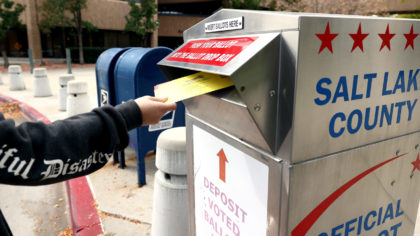


SALT LAKE CITY — Utah voters are deciding whether to amend the Utah Constitution to allow the legislature more leeway with the money it spends during an emergency.
Right now, the legislature can appropriate up to one percent of the state’s budget. Voting “for” Constitutional Amendment A means you approve of them spending up to five percent.
A non-partisan voter pamphlet estimates that using last year’s budget, the legislative body’s limit is $277 million in emergency funding. If voters approve the amendment, up to $1.385 billion could be approved.
House Speaker Brad Wilson calls the added spending a “tool” for lawmakers. He says it is needed in case another emergency halts spending and thus state taxes from bringing in revenue — as COVID-19 did.
“When the economy comes to a screeching halt, the state has to cut the budget to balance the checkbook,” Wilson said. “And this provision of raising the ceiling to five percent is going to give us a lot more flexibility.”
Opponents argue the legislature already has the power to call itself into special session. They say a voter-approved amendment in 2018 allowed for that. They also say this amendment would give the Republican supermajority legislature more ability to dictate spending priorities.
Prior to that change, the legislature and governor had to work together to call a special session to appropriate that much money.
The amendment also has some exclusions for when there’d be no cap on the spending in a legislature-called special session. One of those is “an appropriation of money that the state receives from the federal governement” to address an emergency.
Meaning, there would be no cap on what lawmakers can spend if Utah receives federal money, like it did with COVID-19 pandemic. That could open the door for funding major state projects with money that would only be a one-time deal.
It also can’t appropriate money that “decreases the amount of money previously authorized to be spent.”
Meaning, the legislature can cut any previous spending bills and it’s not included in the five percent cap.
“I wouldn’t characterize (expanding the cap) as giving the legislature more power,” said Speaker Wilson. “I think the question is do voters want to give the people they sent to the state capitol the tools they need to do their job in the event an emergency.”
The legislature called itself into special session multiple times in 2020 and some of the agenda items were not related to the COVID-19 pandemic. In May of 2021, they called themselves in for two resoultions related to Critical Race Theory and making Utah a 2nd Amendment Sanctuary City.
Wilson argues that despite this potential new power, legislative checks remain.
“Any appropriation that’s done in a legislative-called special session still goes to the governor for his or her approval or veto,” he said.
Lawmakers overwhelmingly approved HJR 12, Proposal to Amend Utah Constitution – Special Session Appropriations, in the 2021 General Session. Utah legislators approved the resolution with the required two-thirds majority. The Senate passed HJR12 unanimously, the House approved HJR12 with a vote of 68-5 with two absent.
That vote sent the proposal to the ballot for Utah’s voters to give — or not give — the final okay.
Have a story idea or tip? Send it to the KSL NewsRadio team here.